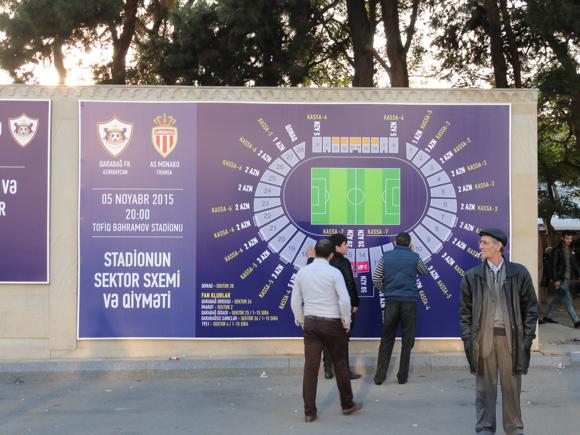A fan’s guide – the club from early doors to today
Few clubs have emerged triumphant from a history as patchwork or as tragic as Qarabag in recent years. Champions of Azerbaijan six times from 2014, the Horsemen have been galloping ahead in Europe as no other team from the region since, perhaps, Dynamo Tbilisi in the 1980s. In 2017, Qarabag became the first Azeri club to qualify for the Champions League.
Despite the heavy defeat at Chelsea that marked Qarabag’s underwhelming debut in Europe’s premier competition, the Azeri champions attracted a full house for the visit of Roma to the Baku Olympic Stadium, the national arena hired out for the three home games of the group stage. A narrow defeat was followed by two draws against recent finalists Atlético Madrid, proof that qualification was no fluke.

The Roma game was also Qarabag’s debut at the 69,000-capacity new-build in the far north-east of the capital, out towards the airport. Until then, home European fixtures had been played at Baku’s Tofik Bakhramov Stadium, even the fixture with FC Copenhagen in August 2017 that led to Champions League qualification.
As for domestic fixtures, since 2015 these have been moved to Qarabag’s own new stadium in Yeni Sukhrani, even closer to Baku airport. Named after the holding company, Azersun, of club owner Abdulbari Gözel, himself a one-man success story of modern-day Azerbaijan, Qarabag’s home holds 5,800.
‘Home’, though, is a different concept where Qarabag are concerned. The club was founded in 1951 in Aghdam, south-west Azerbaijan, and, after several name changes, won the regional championship as Qarabag in 1988.

Shortly afterwards came independence from the USSR – and the Nagorno-Karabakh war with Armenia. Aghdam, and Qarabag’s stadium, Imarat, suffered serious damage, its entire population fled east. Aghdam, once a community 40,000 strong, is has been a ghost town ever since. The stadium is still rubble.
Qarabag relocated to the capital, Baku. Around the same time, bullish young forward Gurban Gurbanov began scoring goals for fun, first for his home club of Dasqin Zaqatala then for title-winners Neftchi Baku – not to mention the national team, for whom he is still the all-time top scorer.
Equally prolific in the domestic game at the time, Mushfig Huseynov scored over 100 goals for Qarabag through the 1990s. Under coach Aghasalim Mirjavadov, the refugee club did the double in 1992-93 and kept a steady presence near the top of the table.

After Mirjavadov’s departure, long-term form dipped. Though, like Neftchi, never relegated, Qarabag trod water until Gurbanov arrived as coach in 2008. With a combination of local young players, proven foreigners such as Macedonian Artim Šakiri and Albanian Admir Teli, and a quick passing game, Gurbanov won the cup in his first season. He then led his team to victory in their first European venture, over Rosenborg Trondheim, and Wisla Kraków in the next.
In the league, needing to beat the stranglehold of the traditional Baku clubs, Qarabag brought in Brazilians Richard Almeida and Reynaldo, able to provide and put away goals. Pipped by Neftchi to the title in 2013, the Horsemen won the league in 2014, Reynaldo bagging 22.
While home gates averaged under 2,000 in the league, European games at the Tofik Bakhramov were now a national celebration, the popular Qarabag attracting 30,000 Azeris waving tricolour flags for the visit of Eintracht Frankfurt.

In 2014-15, the men in black went one better, winning the double and coming within an away goal, Red Bull Salzburg’s, of a group-stage spot in the Champions League. Overcoming Twente Enschede in the Europa League, Qarabag managed draws with Internazionale, St-Étienne and beat Dnipropetrovsk in the group stage.
A year later in the same competition, after losing narrowly to Celtic in a Champions League qualifier, Qarabag led moneyed Monaco 1-0 before the Monégasques escaped with a point thanks to a freak equaliser. In terms of home games in Europe, the goal was the first that Qarabag had conceded in six games, the game the tenth consecutive one unbeaten.
Again romping away with domestic league and cup in 2016-17, in Europe Qarabag overcame IFK Gothenburg and PAOK Salonika but succumbed to Fiorentina.
Attracting more foreigners to the squad – Spaniards Michel and Quintana, South African goalgetter Dino Ndlovu – Gurbanov’s Qarabag picked up more domestic silverware and claimed more scalps in Europe. Arsenal and Sporting Lisbon provided the opposition in the Europa League group stage in 2018-19.
Stadium Guide
The field of dreams – and the stands around it




For most European games, Qarabag either fill the Baku Olympic Stadium or the Tofik Bakhramov Stadium to capacity. See those pages for details of transport and bars.
The Horsemen play domestic fixtures at their own Azersun Arena. Holding 5,800 and opened in September 2015, it’s located just off the airport road, north-east of town. If you’re coming from the city centre, the nearest convenient departure point is Qara Qarayev on metro lines 1 and 2. Beside the metro station, take buses 113 or 191 directly to the Azersun Arena, a trek of at least 30min. A taxi from the next metro station along, Neftchilar, would mean a journey of around three kilometres and shouldn’t be too expensive.
getting in
Buying tickets – when, where, how and how much


For league games, admission is a nominal fee, pay at the game. European games at the Tofik Bakhramov are almost always sell-outs, tickets sold at the stadium offices, priced at AZN2/€1 around most of the ground and AZN5/€2.50 in sectors 11, 12, 17, 18, 29 and 36. Home fans occupy sectors 2, 4, 24-26.
See also the Getting In section of Baku Olympic Stadium for further details.
Fans of visiting teams will have their own ticketing arrangements organised by their own club.




